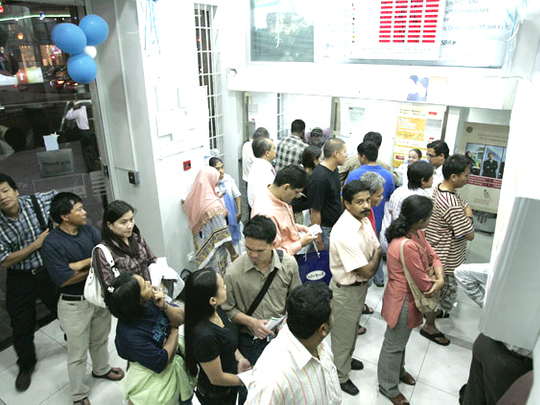
Dubai: Expatriates in the UAE, particularly those from the Philippines and India, have been enjoying a big windfall, as the US dollar continued to strengthen in the run-up to the outcome of the US presidential elections.
The financial markets grew more confident on Tuesday that Hillary Clinton would win the polls, causing the greenback to strengthen further. The American currency has been gaining strength since May this year, on the back of positive economic data and rising expectations of another rate increase by the Federal Reserve.
The Philippine peso plunged to more than 13.24 per dirham on Monday, the lowest so far this year according to the historical data published by aed.fxexchangerate.com. The Asian currency breached the 13 to Dh1 level for the first time in years only last January. The Indian rupee, meanwhile, reached its lowest level this month at more than 18.8 against the dirham on Friday and Saturday.
The rising value of the US dollar, to which the UAE currency is pegged, is a boon to remitting expatriates in the UAE. A higher dollar means UAE expatriates get to send home more pesos, rupees or euros with their hard-earned dirham.
Just last week, remittance volumes to the Philippines alone rose by 31 per cent, according to one exchange outlet based in Dubai.
“The dirham is pegged to the US dollar, which is enjoying a strong period, based on economic news from the United States, and a recovery in the job market. This means that the dirham is gaining strength against currencies, such as the Indian rupee and Philippine peso,” said Sudhesh Giriyan, COO of Xpress Money.
Giriyan said the peso-dirham exchange rate stood at around 13.26 as of Monday. He said the weakening of the peso can be attributed not just to the strengthening of the US dollar, but to the political situation in the Philippines.
“The incumbent government is taking a hard line on some issues- that could be raising investor fears,” Giriyan told Gulf News. “A slowdown in China, stagnation in the European Union and Japan, and uncertain movements in other emerging markets are also impacting the peso,” Giriyan told Gulf News.
Giriyan said they’re seeing an increase in remittance transactions, particularly from the Filipino expatriate community, as a result of the weakening of the Philippine peso. “We’re seeing larger volumes being sent home by OFWs (overseas Filipino workers),’ said Giriyan.
“The peso weakening is good news for remitters in the UAE and other markets. The Filipino diaspora is economically active, and has deep ties with its communities back home. These close-knit ties have resulted in regular remittance flows that has brought the Philippines to third on the list of largest remittance receivers worldwide.”
Promoth Manghat, chief executive officer of UAE Exchange Group, said that if the US dollar continues to maintain its strength, the UAE dirham “will provide an opportunity for the expats,” especially those from South Asian countries, to “cash in on the favourable exchange rate as their home currencies are likely to depreciate.”
He noted that the Philippine peso actually plunged to a seven-year low in September 2016. “One of the major factors of the depreciation could be attributed to the political unrest in the Philippines. A stronger US dollar, too, impacted the peso adversely.”
“The uncertainty about the next US Federal Reserve policy and other global and socio-economic conditions [have also] influenced the peso depreciation.”
As for the currencies of other developing countries, Manghat said their depreciation has been caused by the slowdown in EU growth and stagnation in China.
The rise of the US dollar has been beneficial to the remittance industry. Manghat said they witnessed a 22 per cent “spike” in remittances to the Philippines alone between August and September. Just last week, remittances to the Asian country went up by 31 per cent compared to a week earlier. “Whenever the US dollar strengthens, the other currencies tend to depreciate, spiking up the remittances.”


